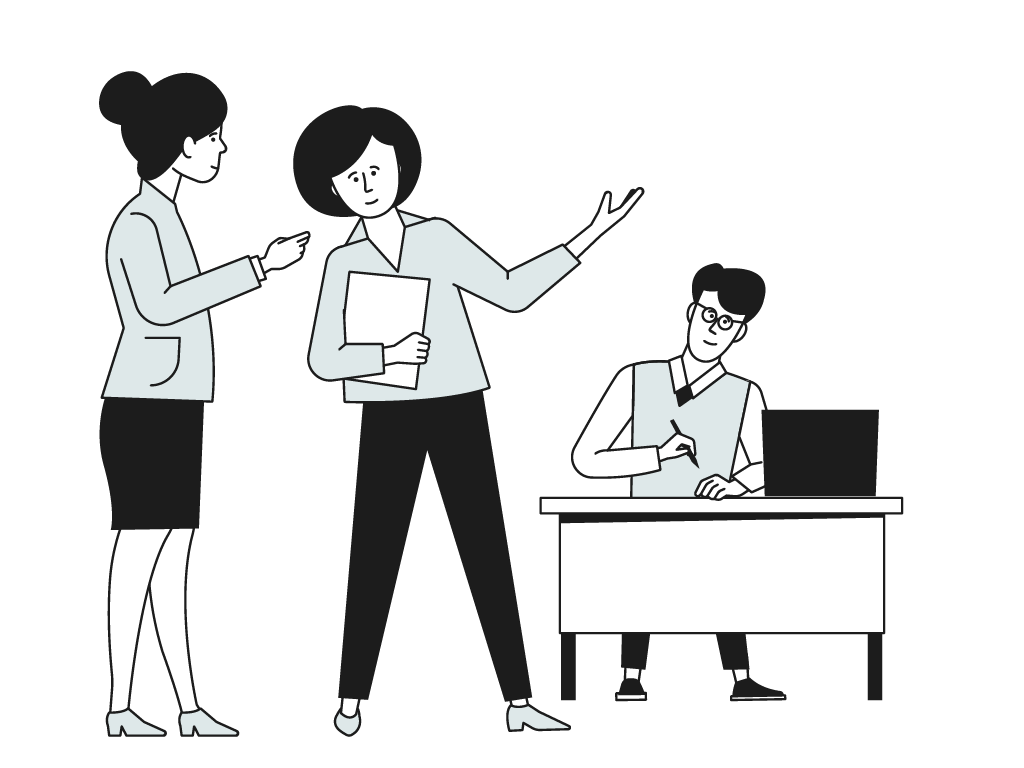Internal mobility
and career support
Between periods of crisis and recovery, companies are faced with transformation needs, whatever their sector, size, resilience or growth dynamic. This represents both opportunities and risks for organisations and human resources, and calls into question their culture of internal mobility and the way it is managed.
The challenges of professional support for internal mobility
88% of HR managers consider professional support for their company's transformation to be a priority action for the HR function (Gras Savoye Willis Tower Watson Barometer, 2021).
There are many issues at stake
- How can we adapt to the change in the 'balance of power' between the company and its employees, with employees increasingly willing to leave unsatisfactory jobs?
- How can we tackle the major skills shortages in many sectors?
- How can we better support the significant contribution required from middle management?
- How do you strike the right balance when it's difficult to return to the workplace?
- How can we better manage the transformation of the company's business lines to avoid a skills drain and high staff turnover?
- How can we identify and secure the mastery of key skills to develop the employability of our employees and restore meaning to work?
- How do you know if an executive is ready for in-company coaching?
If you don't know how to answer these questions, you risk losing staff in waves. This has a significant cost for the company: loss of corporate knowledge, customer relations and productivity, not to mention the cost to human resources of recruiting and training replacements.
Internal mobility enables organisations to sustain their workforce by generating commitment through promotions, lateral moves, temporary projects, extended scopes, etc. The most successful companies are reskilling their existing teams and leveraging internal mobility to address talent shortages and skills gaps.
The 3 main needs for internal movement of executives and senior managers
Our approach to improving professional support for internal mobility
Lack of future career development is a key factor in attrition: nobody wants to feel stuck in their job.
I'm involved in the career development of managers and staff, helping them to change function or role, take up high-stakes positions and acquire a managerial or leadership posture.
To achieve win-win development for the company, its executives and the senior managers affected by a career change.
The benefits of professional support for internal mobility
Avoid recruitment costs by looking at the resources available within the organisation
Avoid the costs of high staff turnover by choosing internal people who are already aligned with your corporate culture
Reduce advertising costs to improve the perception of your employer brand

Let's work together!
Support schemes linked to this theme
Risks to be avoided when providing professional support for internal mobility

?
Find out more about internal mobility and career support
How can internal mobility encourage collaboration and creativity?
If corporate culture is the foundation of a company's success, the internal mobility is an integral part of a strong culture. As early as 2021, McKinsey showed that the three main reasons why employees left their organisation were: they did not feel valued by their organisation, they did not feel valued by their manager, and they felt a lack of belonging at work. Implementing professional internal mobility practices is one way of responding to these perceptions.
What are the different career support solutions?
There are a number of professional coaching practices available to help individuals develop their careers or face professional challenges, depending on their sector of activity. Here are just some of the coaching solutions available:
Skills assessment: personalised support to help you take stock of your skills, aptitudes, motivations and career aspirations in order to define a coherent career plan. The skills assessment is often carried out as individual support.
Professional coaching: individual support to help develop the skills, aptitudes, behaviours and attitudes needed to achieve professional goals. This type of support is often very effective at times of professional transition.
Vocational training: ongoing training programmes (technical training, diploma courses, etc.) that enable specific skills to be developed to improve performance at work according to an action plan predefined in the training programme.
Career guidance: guidance counselling services to help people identify career options that match their skills, interests and aspirations, for example by exploring career profiles. This is often one-to-one support.
Support groups: groups of peers who share similar career paths and offer mutual support in solving professional problems.
Mentoring programmes: programmes where an experienced mentor guides a less experienced mentee through one-to-one discussions to help them develop their skills in their professional environment.
Online training: online training plans offered by training organisations to develop specific skills at your own pace.
Networking events: events organised to enable professionals to meet other professionals, exchange ideas and establish professional contacts.
How can the HR function support employee mobility?
Human resources can play a crucial role in supporting employees' careers by putting in place policies and practices that facilitate and encourage professional career development, for example by
Encouraging career mobility: The HR function can encourage employees to challenge their current career situation by communicating the benefits of mobility, offering training and professional development programmes, and organising meetings with employees who have successfully made the move.
Assessing skills: The HR function can help employees identify their key skills and understand how these skills can be transferred to other positions. This will enable a career path to be proposed with opportunities for internal or external mobility.
Offer training: human resources management includes training plans and professional development programmes to help employees acquire the skills they need for different positions.
Facilitating internal mobility: The HR function can set up internal mobility programmes that allow employees to change jobs or departments within the company. This can help retain talent and meet the company's needs.
Provide financial support: The HR function can provide financial support for employees moving to a new position, such as housing assistance or a mobility allowance.
Establish a professional network: The HR function can help employees establish a professional network by setting up mentoring groups, mentoring programmes or networking events.
How can Pôle Emploi support employees in their career development?
Pôle Emploi's main mission is to help jobseekers find work. However, the organisation can also play a role in providing career support for existing employees. Here are a few ways in which Pôle Emploi can help employees find work:
Propose a training plan: this can help employees to develop their skills and progress in their careers.
Information on career opportunities: this can include information on companies that are recruiting, job vacancies available and career prospects.
Supporting retraining: Pôle Emploi can provide support for employees wishing to retrain. Depending on the type of initial interview, the organisation can provide information on available training, promising sectors of activity and retraining opportunities.
Setting up career transition schemes: Pôle Emploi can set up career transition schemes for employees who want to change jobs or companies. These actions can include a career development plan with training, job search workshops, meetings with recruiters and companies, or validation of prior learning.
Offer advice on career management: Pôle Emploi can offer advice on career management, such as CV and covering letter writing, job interview preparation, work experience, salary negotiation and long-term career management.
